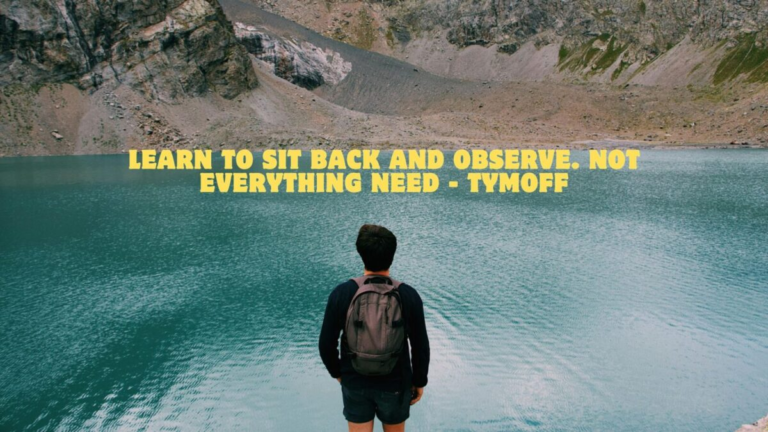In our fast-paced, always-connected world, there’s an increasing emphasis on immediate action and instant results. However, an essential life skill often overlooked in this rush is the ability to sit back, observe, and recognize that not everything requires an immediate reaction. This principle, embodied in the phrase “learn to sit back and observe. not everything need – tymoff,” can lead to better decision-making, reduced stress, and a deeper understanding of the world.
The Value of Observation
Observation is a powerful tool that allows us to understand our environment and the people within it. By taking a step back and simply watching, we gather valuable information that can inform our actions and decisions. This process of careful observation is not about passivity; instead, it’s about becoming more attuned to the subtleties of a situation before intervening.
When we rush to react, we often do so based on incomplete information or emotional impulses. This can lead to mistakes or misunderstandings that could have been avoided with patience. Observing first allows us to see the bigger picture and understand the context, which can lead to more thoughtful and practical responses.

The Psychological Benefits of Patience
Practising patience and observation has significant psychological benefits. Modern life, with its constant demands and rapid pace, can lead to increased stress and anxiety. Learning to sit back and observe helps mitigate these pressures by encouraging a calmer, more reflective approach to challenges.
Patience allows us to better manage our emotional responses. When we give ourselves time to observe, we can process our emotions and reactions more thoroughly, leading to more balanced and considered responses. This practice can enhance our emotional intelligence, making us more adept at handling interpersonal relationships and stressful situations.
Decision-Making: The Advantage of Deliberation
Decision-making is a critical aspect of our daily lives, and the quality of our decisions often depends on the information we have and how we process it. Rushing choices can lead to poor outcomes, as we might overlook crucial details or fail to consider all possible options.
By learning to sit back and observe, we create a buffer of time that allows for more deliberate decision-making. This approach enables us to weigh the pros and cons, consider alternative perspectives, and foresee potential consequences. The result is more informed, thoughtful, and effective decisions that can positively impact our personal and professional lives.
The Role of Mindfulness
Mindfulness, the practice of being fully present and engaged at the moment, is closely related to the concept of observation. When mindful, we focus on our thoughts, feelings, and surroundings without immediate judgment or reaction. This state of awareness is a powerful tool for learning to sit back and observe.
Mindfulness helps us break the habit of reacting impulsively. By cultivating a mindful approach, we train our minds to pause and consider before acting. This practice can improve our ability to respond rather than react, leading to more constructive outcomes in various aspects of life, from personal interactions to professional challenges.
Real-World Applications
The principle of sitting back and observing can be applied in numerous real-world scenarios. In the workplace, those who take the time to observe their teams can gain deeper insights into team dynamics and individual strengths. This understanding can inform better management practices and foster a more harmonious and productive work environment.
In personal relationships, observation can lead to more meaningful connections. By genuinely observing and listening to others, we can better understand their needs, concerns, and perspectives. This empathy fosters more muscular, supportive relationships built on mutual respect and understanding.
Cultivating the Habit of Observation
Developing the habit of sitting back and observing requires conscious effort and practice. Here are some strategies to help cultivate this valuable skill:
1. Practice Mindful Breathing
Mindful breathing is a simple yet effective way to anchor yourself in the present moment. Take a few deep breaths whenever you feel the urge to react impulsively. This practice creates a brief pause, allowing you to centre yourself and approach the situation more clearly.
2. Set Aside Time for Reflection
Allocate specific times during your day for reflection. This could be in the morning before you start your day, during a lunch break, or in the evening before bed. Use this time to reflect on recent experiences, consider different perspectives, and evaluate your responses.
3. Keep a Journal
Journaling is a powerful tool for enhancing observation skills. Writing about your experiences, thoughts, and emotions helps you process and reflect on them more deeply. Over time, this practice can improve your ability to observe and understand patterns in your behaviour and reactions.
4. Observe Without Judgment
One of the challenges of observation is the tendency to judge what we see immediately. Practice observing situations and people without forming immediate opinions. This non-judgmental approach allows you to gather information objectively and respond more thoughtfully.
5. Learn from Others
Observe how others handle situations, especially those who demonstrate wisdom and composure. Learning from their examples can provide valuable insights into applying the principle of observation in your own life.
The Long-Term Impact
The long-term impact of learning to sit back and observe is profound. By incorporating this practice into your daily life, you can expect to see improvements in various areas:
Enhanced Relationships
Your ability to understand and empathize with others will improve, leading to more robust and fulfilling relationships. People appreciate being heard and understood; your observational skills can make you a more supportive friend, partner, or colleague.
Better Stress Management
Taking a step back and observing allows you to approach challenges with a calmer mindset. This practice reduces the likelihood of stress-induced reactions and helps you navigate difficult situations more easily.

Improved Decision-Making
Your decision-making abilities will strengthen as you become more adept at gathering information and considering different perspectives. You’ll make choices that are more informed, balanced, and aligned with your long-term goals.
Personal Growth
The practice of observation fosters personal growth by encouraging self-awareness and introspection. You’ll better understand yourself, your motivations, and your behaviours, which can lead to positive changes and personal development.
Conclusion
In conclusion, the principle of “learn to sit back and observe. not everything needs – tymoff” offers a powerful antidote to the pressures of modern life. By embracing patience and observation, we can enhance our decision-making, improve our relationships, and manage stress more effectively. This practice requires conscious effort and dedication, but the long-term benefits are well worth it. As we cultivate the habit of sitting back and observing, we open ourselves to a deeper understanding of the world and our place within it, leading to a more thoughtful, balanced, and fulfilling life.


